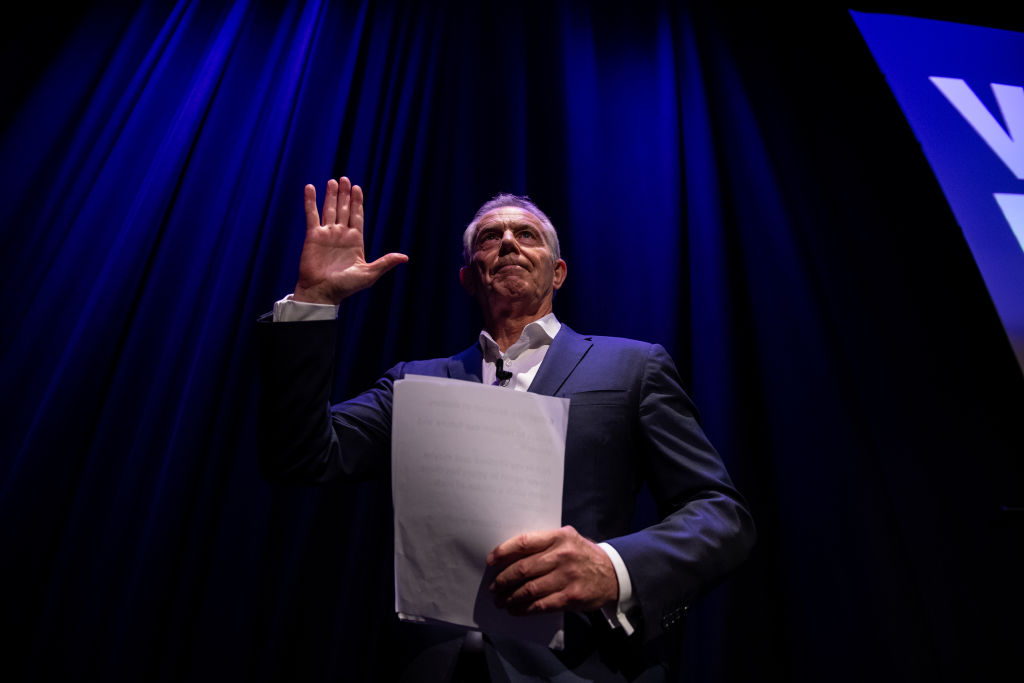Tony Blair has made a tentative return to the heart of British politics by offering Matt Hancock strategic advice on the vaccine rollout. But does the former prime minister’s ambition stretch further than this? More than a decade after leaving office, Blair is said to keen on a ‘De Gaulle style comeback’. For Blair’s critics, it’s an apt comparison. De Gaulle was the so-called ‘father of Europe’, who led Free France during the war years of the Vichy government. He later disappeared into the political wilderness after 1946 before staging a dramatic return a little over a decade later, eventually becoming president for ten years. So could Blair emulate De Gaulle?
You can see why Blair might be keen on a comeback. Whatever you think of him, it’s not unreasonable to see Blair as something of a political heavyweight compared to some of the politicians who have led our political parties since he left office. But while Blair might well fancy his chances of a return to Downing Street, such an ambition makes him look deeply deluded.
Legacy matters a great deal in politics. De Gaulle’s first political ending in 1946 came about due to a foolish move on his part. He didn’t want to have to compromise with the communists so he quit, thinking he was so indispensable, they’d have to beg him back on his terms. Instead, in a way that was reminiscent of what happened to Churchill via different means, De Gaulle was seen as yesterday’s man all of a sudden. He had got the nation through the second World War victoriously and the people were grateful for that, but now they wanted new blood.
To the average voter, Blair is someone from another time, an artefact from a bygone era
Yet the French still deeply admired De Gaulle, just as the British still loved Churchill, despite voting Attlee into government. The Frenchman’s legacy between 1946 and his return in 1958 was of the man who had saved France and helped overthrow the Nazis and their Vichy quislings.
Blair, on the other hand, has no such positive legacy to re-start with. When British people think of Tony Blair, four letters spring to mind: Iraq. Whether Blair likes it or not, this war is his legacy. One can argue that the opprobrium heaped upon Blair post-2007 is unfair; what you cannot dispute is whether that ill-feeling towards the former Labour leader exists and that it is not incredibly widespread.
Don’t get me wrong: I’ve actually warmed to Blair over the last decade. I’ve realised a lot of the reasons I disliked him when he was in power are no longer relevant. I’d bought into Fukuyama’s vision of the end of history; where we’d reached the end point of mankind’s ideological evolution and the universalisation of Western liberal democracy. As a result, I expected more of a British prime minister than Blair seemed capable of delivering. Yet I’ve come to realise this was a mistaken hope. After Theresa May’s premiership, it’s hard for me not to retrospectively feel that I was being harsh on Blair. I now think that he was the last great prime minister that we’ve had to date.
Yet it’s safe to say that not many agree with me. Will the British public forgive and forget their feelings about Blair? No. Will Blair be able to shake off Iraq and be seen again as the ‘cool Britannia’ PM Brits voted for in 1997? Of course not.
Whether it is fair or not, history has made its mind up on Tony Blair. And for every political faction and grouping of the current era, Blair is problematic.
To Brexiteers, he is someone who conspired to try and keep us in the EU; to liberals, he is not only the architect of the Iraq war but a prime minister who trampled all over civil liberties; to the left, he is the betrayer of their values, the man who sold Labour out to the highest bidder; to the centre-left, he is the guy who announced he was riding to the rescue to save British centrism a few years back, only to then set up an organisation bearing his name that talked about Middle Eastern politics most of the time. To your average run-of-the-mill voter, Blair is someone from another time, an artefact from a bygone era.
Unlike a lot of people, I do not begrudge Tony Blair a financially successful post-premiership career. I know there is a tradition in Britain of ex-prime ministers seeing out their dotages making lame backbench speeches and working for charity, but I do not blame Blair in the slightest for eschewing this convention. Yet how he has not grasped the simple fact that in pursuing this career over the past decade he has, in turn, destroyed any chance of a political comeback is beyond me.
For someone who made a name for himself by being ultra-politically astute, Blair sometimes fails to grasp some pretty basic things about political reality. I hope these off the record remarks about a ‘De Gaulle style comeback’ are all just wind. I would be embarrassed for Tony Blair otherwise.







Comments